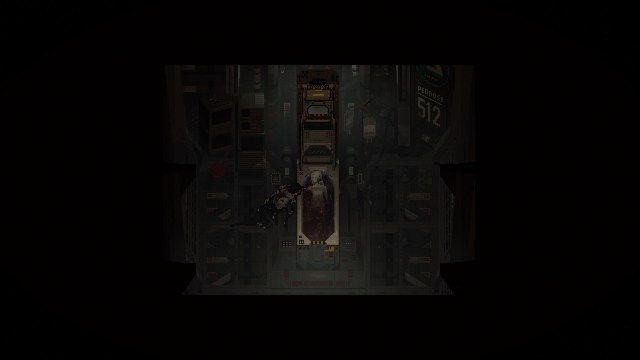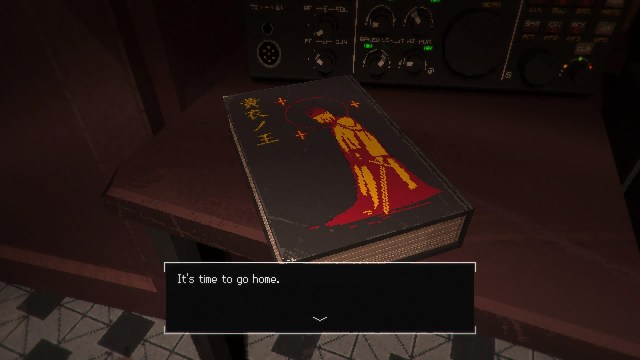It’s been around a year since I first played Signalis, and a year since it wormed into my brain. No matter how much I think about it, watch video essays about it, or replay it, something lingers.
Unraveling its secrets, getting to the heart of what Signalis is trying to do or say haunts me almost a year later. There are few games like it — Signalis hammers in its sense of hopelessness and rips my heart out with every playthrough. Everything about it feels oppressive and dire, but in a way that’s hard to move on from. I’ve embarked on Elster’s journey again and again, hoping for a better end, running this treadmill of maddening sadness. But it’s easier to go back here than move on.
So why is it that, in a year of titans like Baldur’s Gate 3, Zelda, and Armored Core, I’m still going back here? Signalis’s perpetual chokehold is probably best explained by its marriage of misery and love, a union of survival horror and sapphic works I long for.
Before moving on, I will warn there are story-heavy spoilers ahead for Signalis, including all of its endings.

Perhaps, this is Hell
Signalis leaves much to interpretation regarding its plot, but some things are made clear. Its basic premise sees an android (Replikas in this universe) named Elster attempting to find her designated Gestalt (human), and it doesn’t deviate from that. Elster devotes herself to Ariane Yeong, her crewmate aboard the Penrose-512, and also her lover.
So much of Signalis feels familiar, too. It plays like an amalgamation of classic survivor horror titles, taking the inventory management and save rooms from Resident Evil and mixing practical puzzles with ones operating on dream logic like Silent Hill. That, alongside its lo-fi polygonal art style, resembles survival horror titles from the PS1 era while keeping actual comparisons scant enough to stand on its own.
While Signalis’s gameplay loop is solid, its story and themes are its beating heart and soul. Devotion, in particular, plays a constant role, and it’s one that never pays off for its characters. Signalis is tragic — unabashedly bleak as it is sapphic. Its conclusions range from soul-crushing to simply devastating, but none of it matters because the events repeat themselves.
However hard Elster tries to break the hell she and Ariane are living, everything restarts, and they remain in perpetual misery. The cycle of tragedy borders on comical, but just like the cyclical nature of their doom, I keep going back here even when I know better. Even a year later.

I will always remember our promise
There’s a moment in Signalis where it truly sells Ariane and Elster’s love. While there’s always plenty of dialogue, this scene leaves the couple mostly quiet, cuddling through Ariane’s calm and melancholy theme. And through their embrace, the sights and sounds convey the inherent isolation that comes with traveling in a small spaceship.
It’s that tragic, longing embrace that makes repeating Signalis worth it. Another comes earlier, from one of its first-person segments, as Ariane takes a lonely train ride. Her distance from the player, mixed with the dim lighting and haunting music, creates a deeply personal yet detached scene. Nobody speaks here, nothing urges you forward, Signalis allows players to linger as much as they want.
It’s profoundly lonely. Every time I play Signalis, I stop in this scene and sit for a few minutes, simply taking in one of the few moments Elster sees Ariane. That feeling snowballs its pain into something worse as Ariane vanishes and Elster travels alone within someone else’s memory
Gameplay takes advantage of this desire for intimacy, implying the photo Elster finds is somehow important for exploration. It sits in her inventory, taking up a limited slot, but never comes into play. There’s no tangible value in holding onto to that photo, but it’s impossible to escape what drives Elster forward without truly going anywhere. Dropping it off is encouraged, but it’s hard to let go of something seemingly so important.
The magic in Signalis’s story is its vagueness. From living several characters’ memories to its ambiguous reality, the game never goes out of its way to explain anything beyond Elster and Ariane’s love for each other. That’s rightfully among its biggest praises, even if it means sacrificing clarity. The gnawing ambiguity is universally familiar, but when looking at Signalis from a sapphic perspective, that rings truer — and a bit more complicated.

Signalis as a sapphic tragedy
While media at large can’t seem to stop killing off its lesbian characters or just tanking their roles and canceling projects altogether, treatment in games is somewhat better. Although largely in the indie space, there are many great lighthearted games with queer women in leading roles. Signalis stands incredibly stark in contrast; it’s bleak in all regards but just as comforting.
It also always ends with one or both members of its couple dying. It’s easy to dismiss these moments as another instance of bury your gays, but Signalis is more interested in explaining what drives their perpetual resilience. It doesn’t need fairytale endings; there’s comfort in the familiarity of its cycle.
The “Artifact” ending is the closest to a happy ending, and it might be one. My favorite interpretation is that Ariane ascends to godhood with Elster at her side, and they find closure. It could also be, in the most literal interpretation, Ariane and Elster coming to terms with slowly dying in a failing ship. Whatever your takeaway on those events are, resetting is always an option. Any answers Elster finds in an ending no longer exist as soon as a new playthrough begins.
Yet, despite whatever bleakness is present within the events, the intimate moments keep Signalis from becoming emotionally cold. Moments like Ariane and Elster sharing a kiss before dancing to them holding each other show that no matter how many times they relive this hell, their love for each other never fades.
It’s not as if the intimate moments and heart-breaking moments are exclusive to each other either. As sad as the “Memory” ending is, Elster lying next to Ariane as she dies is strangely warm. Ariane strokes Elster’s hair as she rests before passing away and repeating the cycle once more.
Elster repeating the events complicates the idea of death because while the lack of a true end adds to its bleakness, it means she can try again. Rather than fully bury its gays, Signalis repeatedly raises them to try again so long as their love never fades.
In a way, that also means their hope for freedom never dies. Perhaps it’s impossible, but Signalis is never outright hopeless. Its narrative frames Elster as someone who will never give up on saving Ariane through whatever means possible. Their story might be tragic, but Elster’s love for Ariane is more powerful, or at the least more stubborn than any cosmic horror she faces.

Finding closure in Signalis
Signalis hurts so much for me because the story always resets, and Elster never wavers in her devotion. It doesn’t matter however many times she forgets Ariane, or Ariane forgets her — they always find their way back to each other. And I’m drawn back there, too. Elster doesn’t go to hell and back for Ariane; she spends eternity trudging through it for her. Her devotion is equally as touching as it is tragic.
Signalis stands on its own as a horror experience whose inspirations are noticeable, yet its identity remains its own, not just within survival horror but also in the broader scope of queer gaming. Sure, it’s another tale of doomed lesbians, but it’s also an amazingly earnest depiction of love.
Because almost nothing is explained, we experience Elster’s raw emotions, or at least that’s what I take away. After mulling over my feelings for so long, the closest I find to a coherent is that there’s little purpose in understanding what the in-universe truth is behind everything occurring.
To some deep and inexplicable degree, I feel connected with Ariane and Elster’s struggle to find an end to their pain — it’s just as much my experience as a queer woman. To also see the moment they’re happiest hurts almost as much as their suffering because the context of our joy is often rooted in tragedy and distant memory.
My closure is in the emotional reaction, Signalis’s tortured push and pull on reliving your pain. That’s the best I can take away from a game that keeps me anchored in its world. A game that, even a year later, offers me nothing more than a promise to hurt. That constant draw is as unexplainable as my emotions towards it, and all I can hope is for Ariane and Elster to eventually break out of their hell.





Published: Nov 9, 2023 04:49 pm